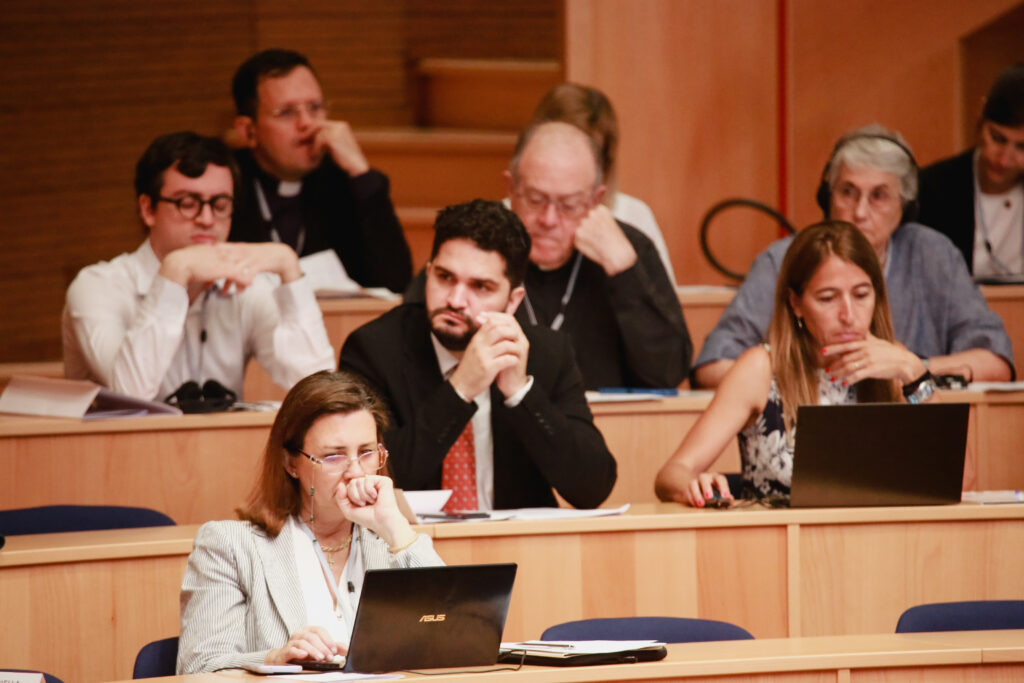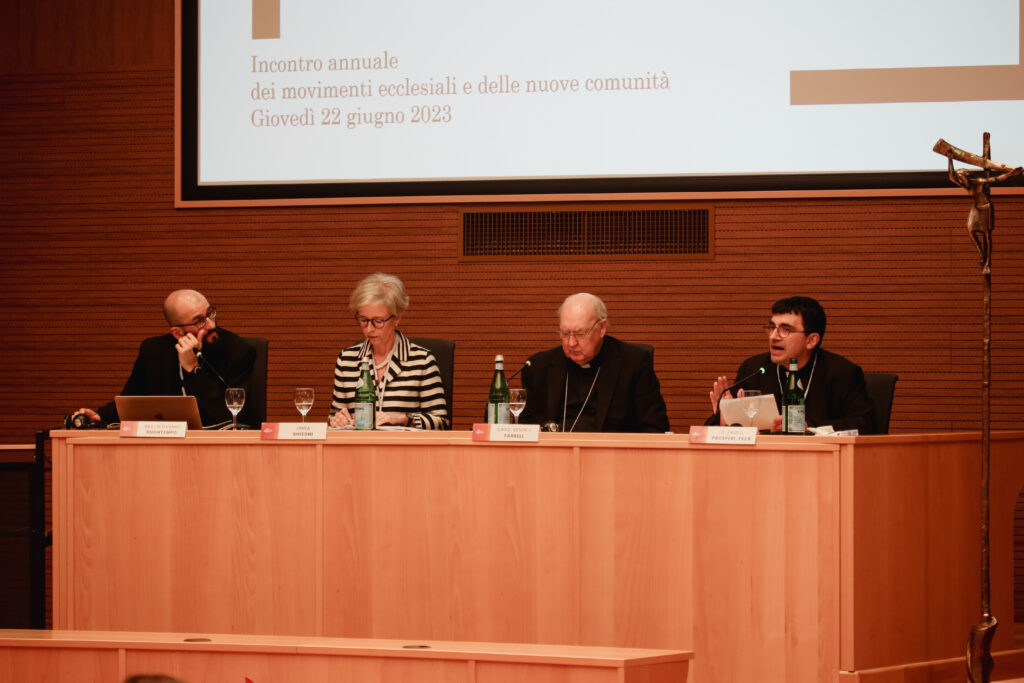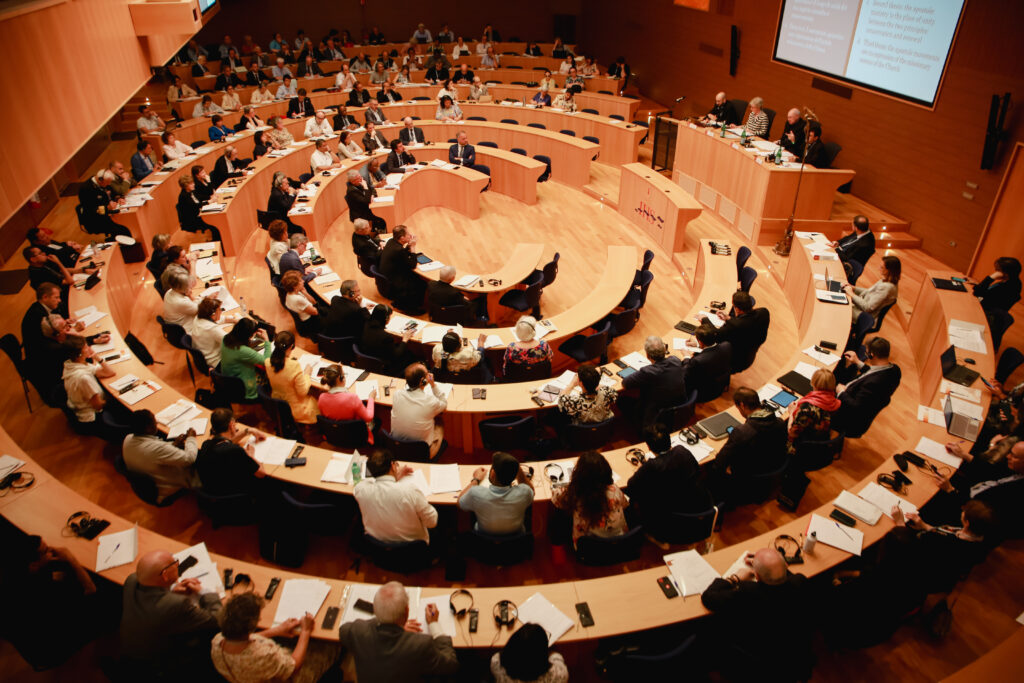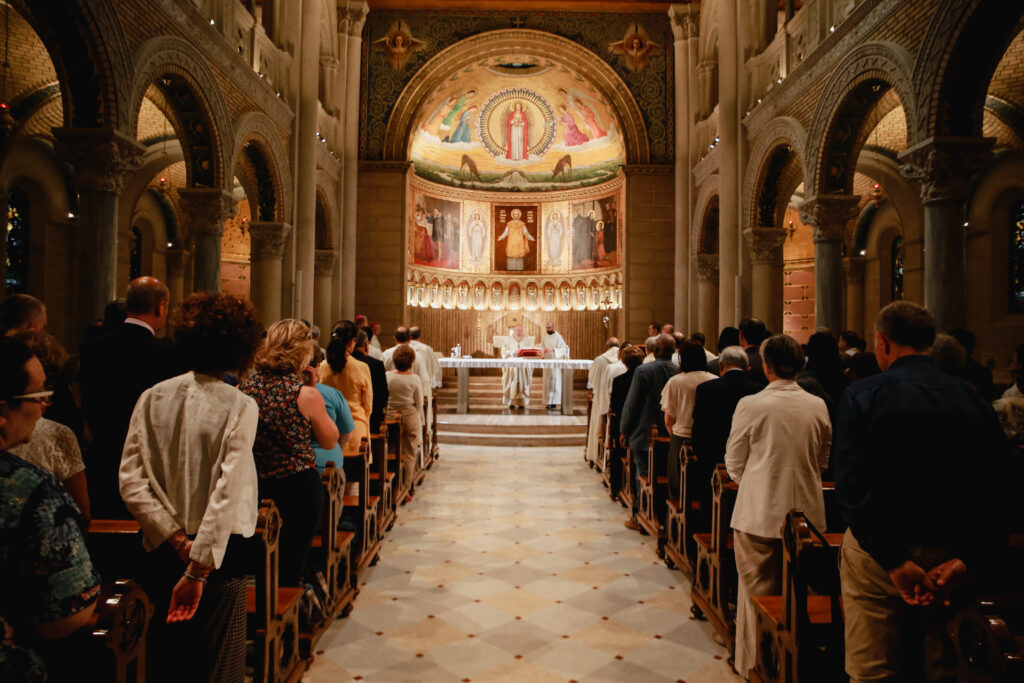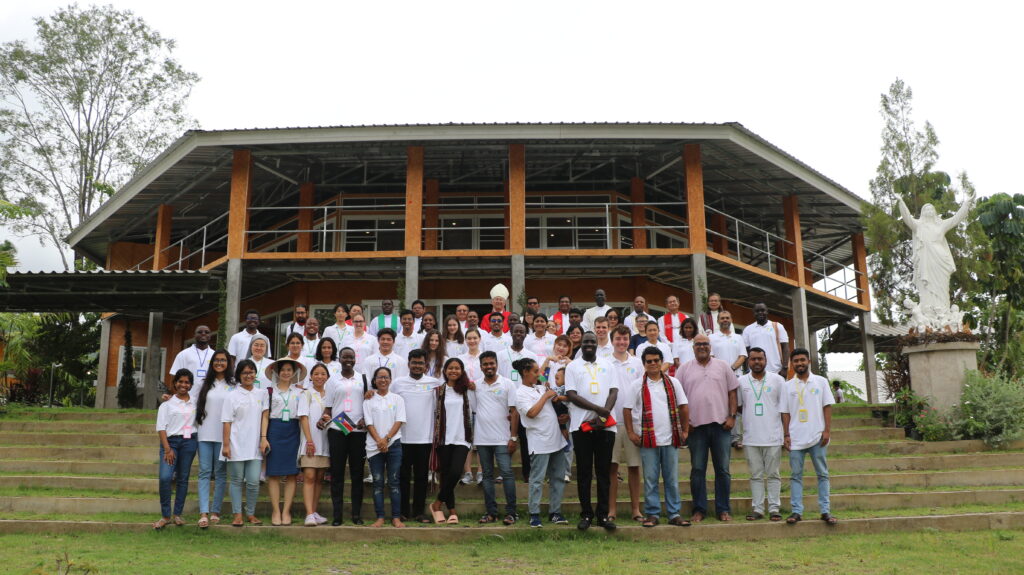
Rise Of Global Charity In The Modern World
Lorem Ipsum is simply dummy text of the printing and typesetting industry. Lorem Ipsum has been the industry standard dummy text ever since the 1500s, when an unknown printer took a galley of type and scrambled it to make a type specimen book.

Why You Must Experience Charity & Donations
Lorem Ipsum is simply dummy text of the printing and typesetting industry. Lorem Ipsum has been the industry standard dummy text ever since the 1500s, when an unknown printer took a galley of type and scrambled it to make a type specimen book.

Why Choose Us For International Business Consulting!
Consectetur adipisicing elit, sed do eiusmod tempor incididunt ut labore et dolore magna aliqua. Ut enim ad minim veniam, quis nostrud exercitation ullamco.

Why Choose Us For International Business Consulting!
Consectetur adipisicing elit, sed do eiusmod tempor incididunt ut labore et dolore magna aliqua. Ut enim ad minim veniam, quis nostrud exercitation ullamco.

Why Choose Us For International Business Consulting!
Consectetur adipisicing elit, sed do eiusmod tempor incididunt ut labore et dolore magna aliqua. Ut enim ad minim veniam, quis nostrud exercitation ullamco.

IMCS human rights internship program in Geneva for Sri Lankan HRDs – March 2024
Ruki Fernando:
From 3rd to 10th March 2024, International Movement of Catholic Students (IMCS) – Pax Romana hosted and supported team of seven Sri Lankan Human Rights Defenders (HRDs) for a human rights internship to learn, experience and use UN human rights mechanisms based in Geneva, Switzerland. The team included Ruki Fernando as team leader, an interpreter and diverse team of five young HRDs. The five HRDs were all grassroots activists, visiting Europe for 1st time (most overseas for the 1st time). They were from different areas in Sri Lanka and were victims of rights violations or from victimized communities. They attended 55th session of the UN Human Rights Council (UNHRC), made two oral statements during the UNHRC, submitted one written statement to the UNHRC, met UN staff from Special Procedures, Treaty bodies and Office of the High Commissioner for Human Rights (OHCHR). They also met a British diplomat who have been working on Sri Lanka for long time, Geneva based NGOs, two HRDs from Rohingya community and Manipur and attended side events at the UNHRC.
Oral statement during interactive dialogue with Special Rapportuer on Freedom of Religion or Belief
IMCS assisted with providing accreditation to the UN, making arrangements to submit the written statement and make two oral statements. During the weekend, IMCS hosted them in IMCS International centre in La Roche, France, for some rest and de-briefing session. IMCS also assisted with logistical arrangements such as accommodation, transport, welcoming at airport, occasional interpretation and general accompaniment. The five participants were selected from amongst more than thirty who had undergone an introductory course on UN Human Rights mechanisms in Sri Lanka in December 2023 – January 2024. Participants are now in process of engaging in follow up activities in Sri Lanka.
My involvement in conceptualizing and organizing this initiative was inspired by my participation in Pax Romana human rights internship in Geneva many years ago and subsequent attempts at training HRDs from Sri Lanka and Asia on UN human rights mechanisms and assisting individual HRDs in undertaking lobby visits to Geneva. Outgoing and former IMCS team members Ravi and Budi provided valuable assistance and advise in organizing the program in Geneva.
Oral statement during interactive dialogue with Special Rapportuer on Right to Housing
The initiative was sponsored by Bread for the World (BfW) in Germany. After the visit in Geneva, BfW had organized a visit to Berlin in Germany, including meetings with the German foreign ministry official working on Sri Lanka, a German MP, German NGOs and Sri Lankan diaspora in Germany. The team also had a chance to join a customized study tour about memorialization for past rights violations in Germany and session on European institutions dealing with human rights.
Links:
Oral statement during interactive dialogue with Special Rapportuer on Freedom of Religion or Belief https://webtv.un.org/en/asset/k16/k160flweyj – Mins 01.02.18 onwards. Text in Annex 1
Oral statement during interactive dialogue with Special Rapportuer on Right to Housing https://webtv.un.org/en/asset/k15/k15m87qyxk – Mins 01.18.09 onwards. Text in Annex 2
Written statement https://documents.un.org/doc/undoc/gen/g24/029/39/pdf/g2402939.pdf?token=xqHdQ8IGbxNS2tcP4H&fe=true – Text in Annex 3
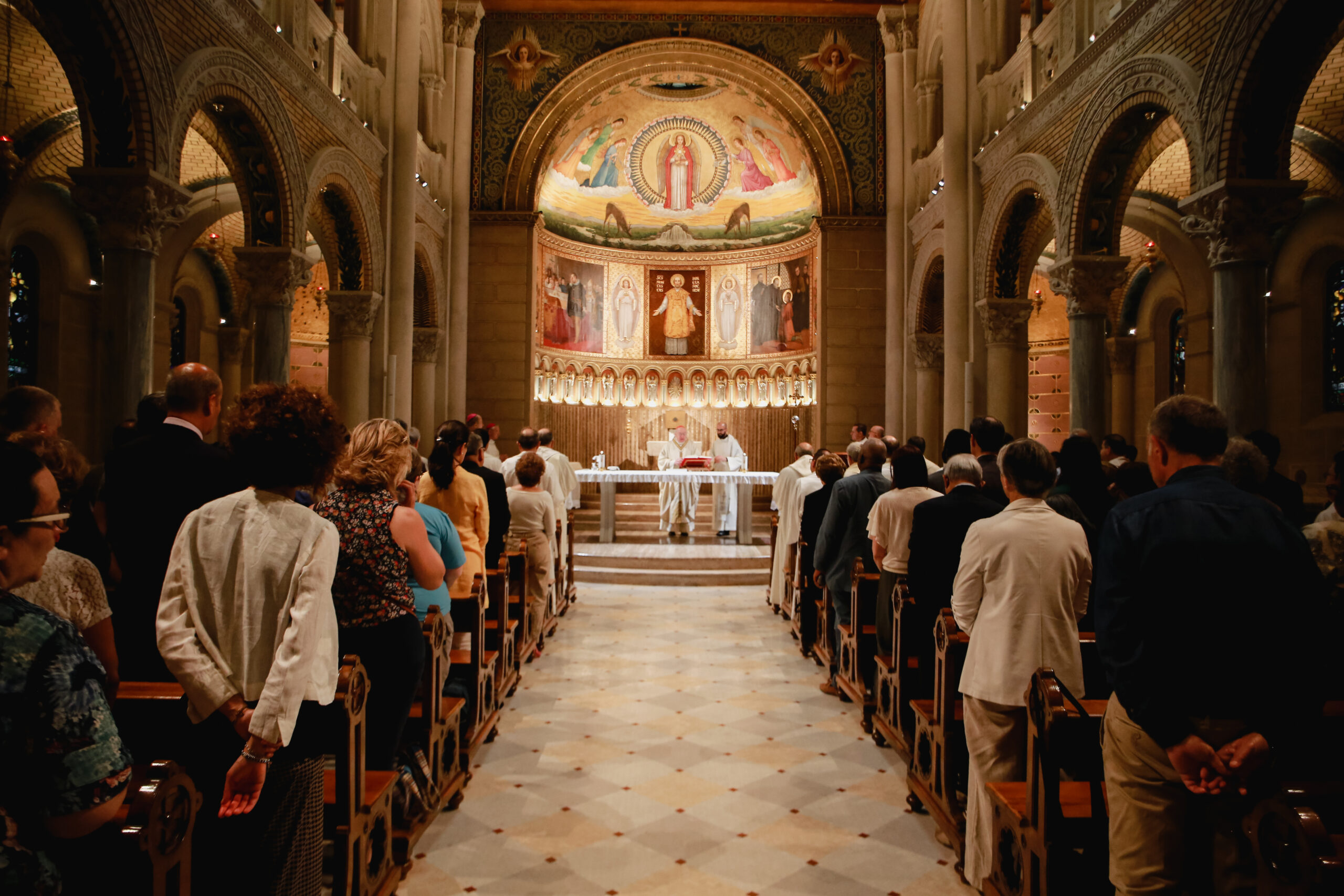
IMCS Pax Romana at the Annual Meeting of Ecclesial Movements held by the Dicastery for Laity, Family and Life.
On the 22nd of June 2023 IMCS Pax Romana was represented at the Annual Meeting of Ecclesial Movements held by the Dicastery for Laity, Family and Life by Francesco Fonte, a member of FUCI and European Coordinating Team Member. It has been a fruitful occasion for reasoning on the renovated role of ecclesial movements in the Church, in the vein of apostolicity. This has been the core theme of the conferences, with speeches delivered by Cardinal Kevin Joseph Farrell, the prefect of the Dicastery, and theologians who are part of the movements.
The reflection of the day was based on a written version of the speech delivered by the then Cardinal Joseph Ratzinger in 1998 at the World Congress of Ecclesial Movements.
The addresses analyzed Ratzinger’s view about ecclesial movements, rooting its approach to the relationship between charisms, the institutional church and related to that the specific positioning of the movements in apostolic communion with the Pope. Furthermore, it was recalled Pope Francis’ invitation to avoid certain tendencies referred to Ecclesial Movements’ today, namely in the contrast of the rising auto referentiality of several realities and in the effects of “personalism” in imposing a predominant personality of view of the movement, especially that of the founder.
Several points which were raised could be useful for the associative discernment of social action movements’ like IMCS Pax Romana. This charism of IMCS is an expression of the plurality of ways in which the laity interpret their positioning in the Church, namely by taking up social action and addressing the need of the oppressed and marginalized people as well as, as repeatedly addressed during the meeting, in the diffusion of Catholic Social Teaching in operative terms.
Link to the news: click here to read about it
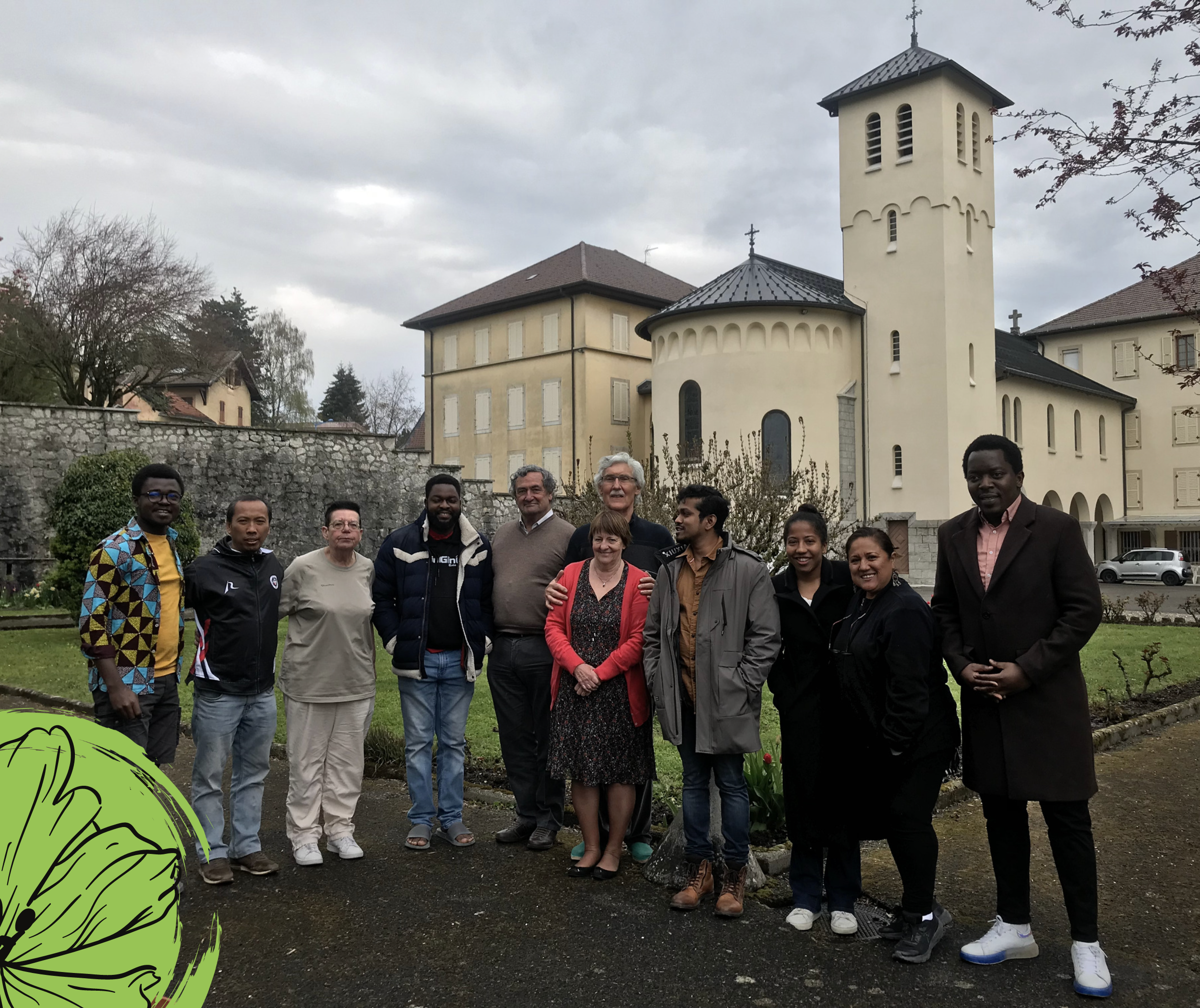
The Meeting of the MIACS in La Roche-sur-Foron
We are happy to welcome all the International Catholic Action Movements (MIACS) – JECI, MIDADE, CIJOC, CARDIJN, JOCI, MIAMSI, FIMARC, MIJARC and MMTC – here inside the Pax Romana Centennial Centre in La Roche-sur-Foron in France for a weekend of dialogue on the dynamics of actions, challenges, missions, our spirituality and evangelisation and the way forward together. In our hybrid session, we explored the relevance of our interconnectedness, our working realities on all levels, and cooperation means supporting each other and working together in a continuum through different generations. Notably, the focus of our specialized Catholic actions continues to bind us to stay in touch with our communities for impact.
Here is an excerpt from our conclusions;
As MIACS we work on various actions within the framework of our responsibilities and commitments, with particular attention to the most marginalised and those living on the periphery, in the face of major challenges such as climate change, peace and poverty. As lay Christians, we live out these responsibilities and commitments with the spirituality of action perspectives, for there is neither a human future in an exclusively materialistic vision nor a Christian life that is not incarnated in human realities.
Hence, we have decided to;
- to research, analyse and make known humanising experiences, which show that living in the spirit of the Gospel has an impact on realities.
- to make these experiences known by developing new methods of communication adapted to today’s world, in particular by using new technologies.
The work of organizing the MIACS joint activities and reflection meetings continues and will be coordinated for coming year by ICYCW and IYCS Secretariats.
This in La Roche sur Foron on 23 April 2023 at the Pax Romana Centennial Centre
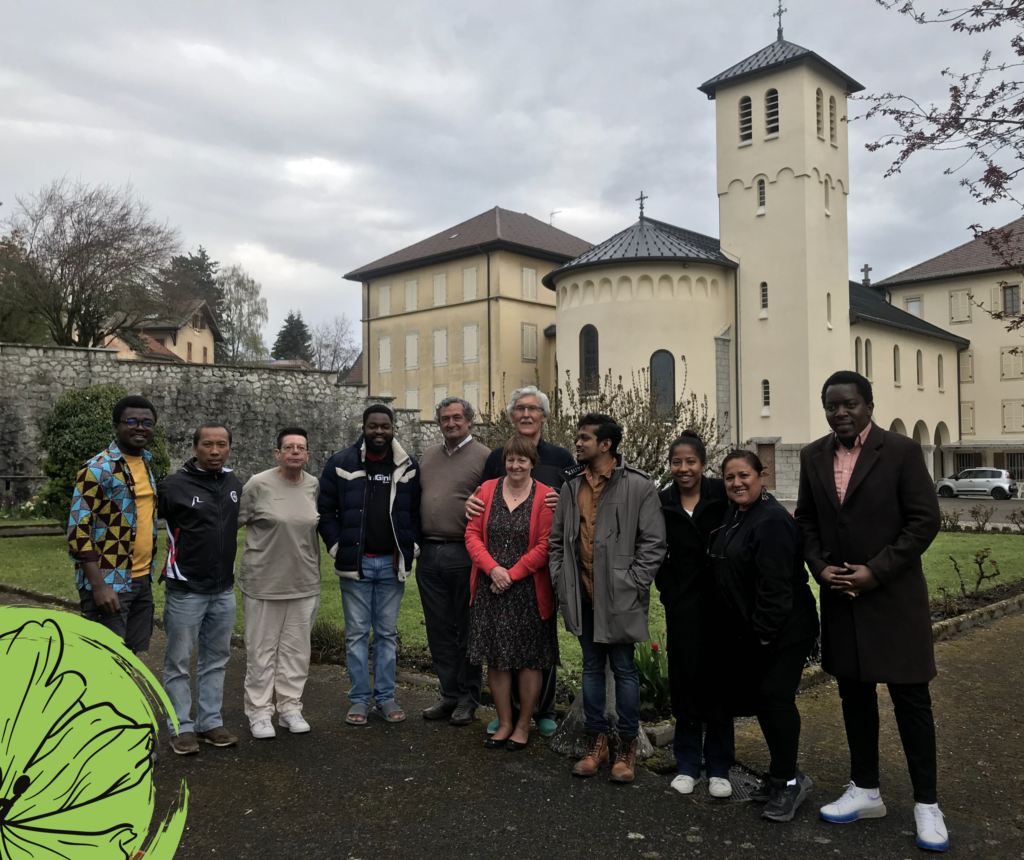
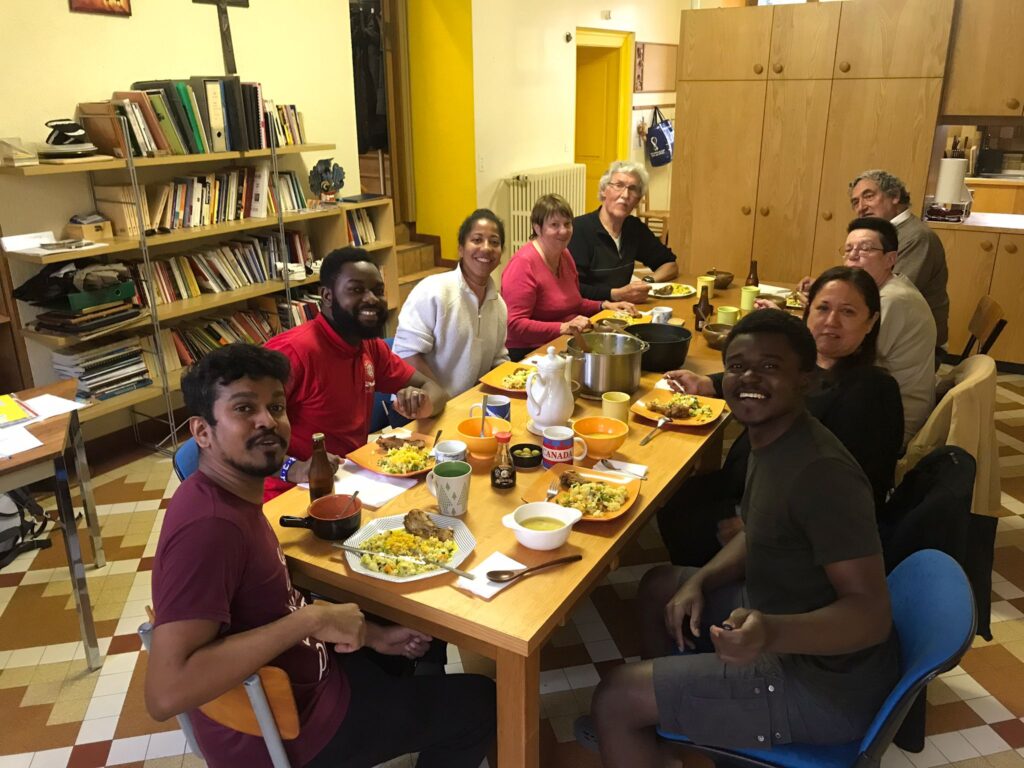
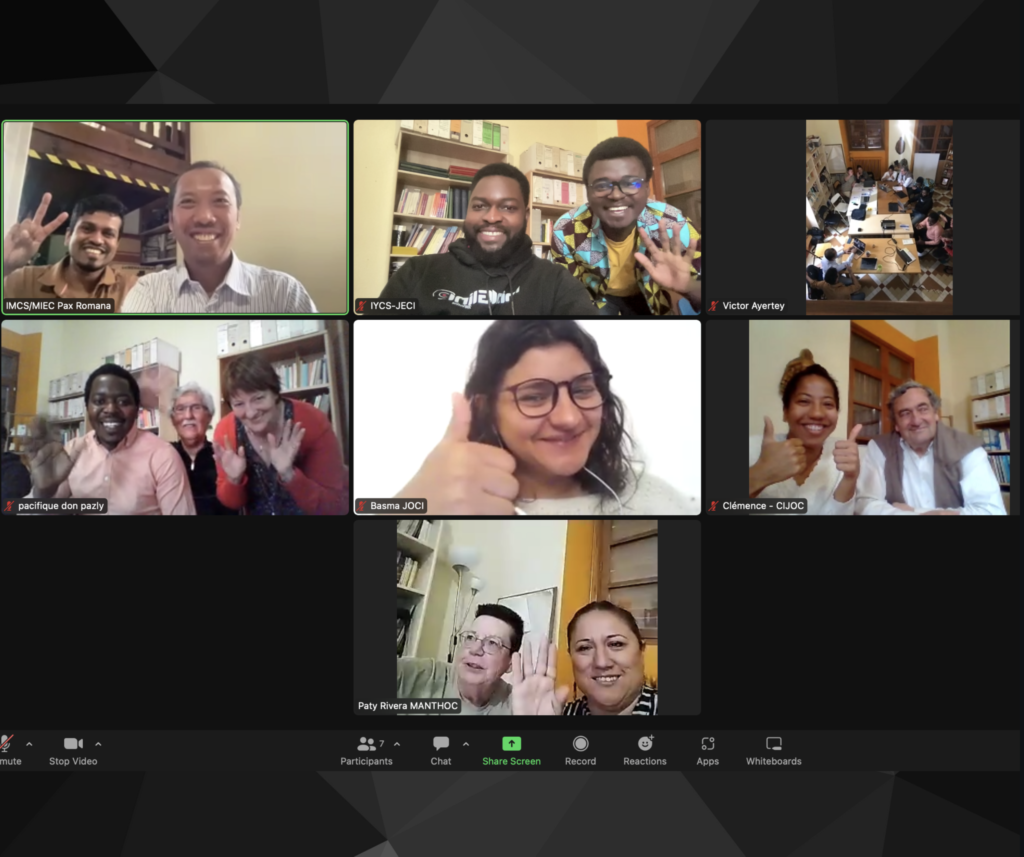
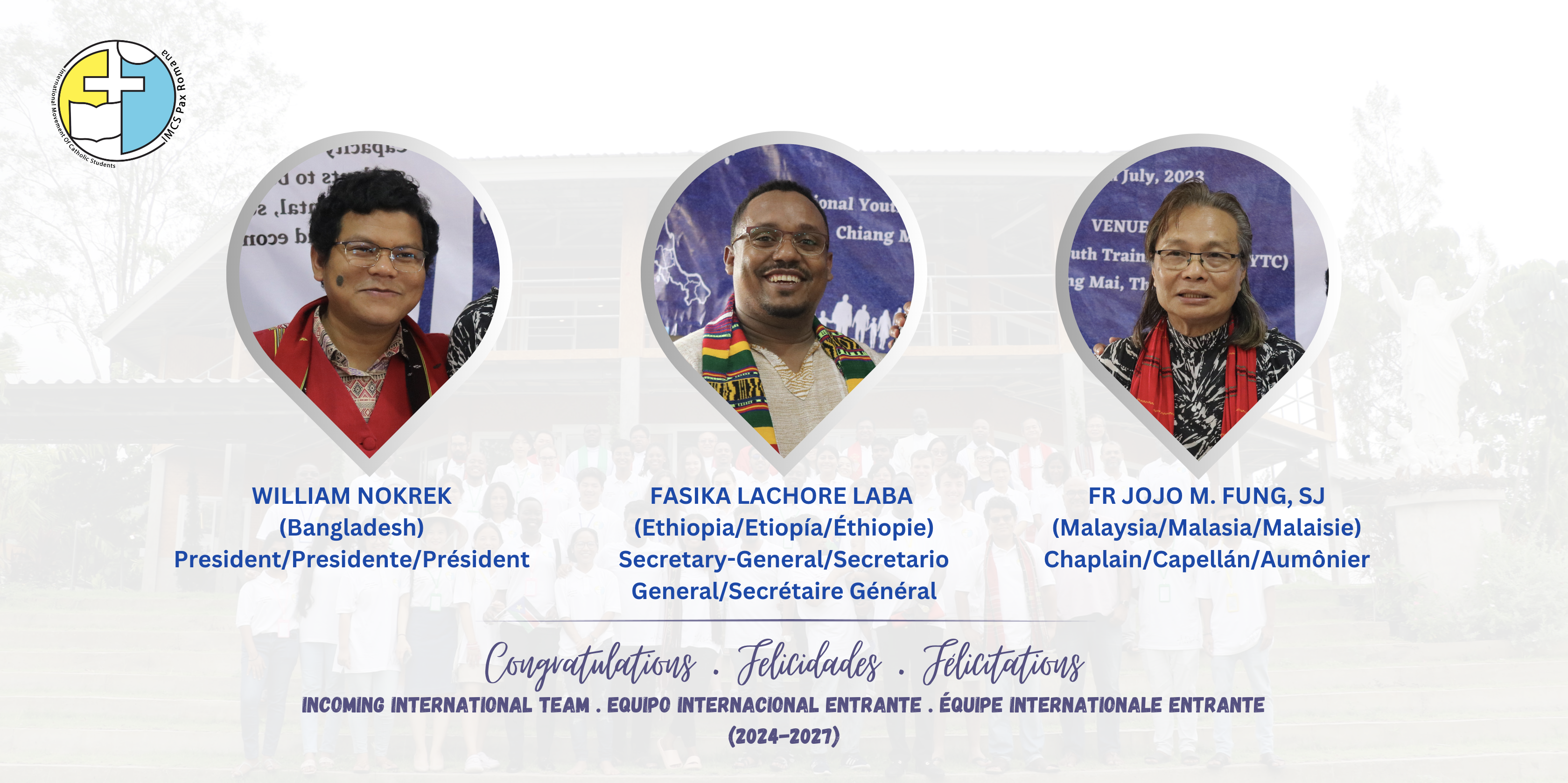
IMCS-MIEC PAX ROMANA ELECTS A NEW INTERNATIONAL TEAM FOR THE 2024-2027 ADMINISTRATIVE YEAR
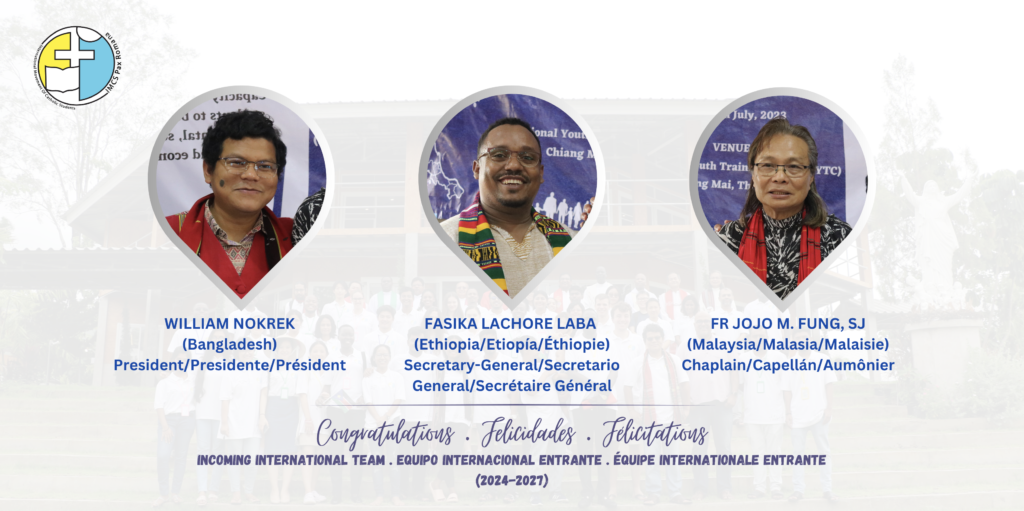
IMCS-MIEC Pax Romana’s leadership has been evolving over the past century with capable leaders seeking to ensure that the Movement continues the mission of ‘Mobilizing students for peace and justice’. Ultimately, the following team was elected to lead the Movement to achieve the objectives of the final plan of action approved by the 2023 delegates of the World Assembly for the next four years. The election took place at the International Youth Training Centre (IYTC) in Chiang Mai, Thailand on July 8, 2023.
WILLIAM NOKREK, International President
William served as the recent Asia Pacific Regional Coordinator from 2019 to 2022. He is an indigenous person from Garo community of Kaowakuri, Sherpur of Bangladesh.
He is a graduate in Journalism, Communication and Media Studies and has a wider grasp of current realities of youth struggles. As a Journalist, he uses his skills in documentation and visual communication to champion the concerns of young people, especially the marginalized communities like the indigenous people. He has been a member of different movements most of his life and led in different capacities. And for the better part of the last decade, he has been working in IMCS-MIEC Pax Romana specifically as a Human rights activist, towards protection of rights of indigenous peoples and Marginalised Communities in Bangladesh and Asia Pacific region; towards Student empowerment, Youth Rights and Meaningful Participation.
Emphatically quoting Pope Francis, as he also called on young people to be “agents of social change”, referencing the Papal message to mark the Pax Romana Centenary Celebration. In addition, William said “I’ve learned and felt that human rights, indigenous peoples’ rights and environmental justice have not just been my passion and work but now it’s become my fundamental commitment. I believe that power is in these young people.”
FASIKA LACHORE LABA, International Secretary-General
Fasika served as the recent Pan Africa Regional Coordinator from 2019 to 2022. He is an Ethiopian and has BSc in Information Technology, Msc in Software Engineering and Pursuing Master Degree in Development Studies at Catholic University of Eastern African.. With a profound dedication to advancing social justice and an unwavering commitment to serving others, he believes that his extensive skills and experiences will help him lead the Movement to achieve its objectives during the Administrative Year.
He has been responsible for East, West, and South Africa through correspondence, planning and managing annual projects aimed at empowering young people. And fundraising for country-specific programs as well as managing the finances and the staff of the secretariat.
As a member of the Movement for over a decade, he has engaged in policy dialogues on various platforms for campaigns, advocacy, formation. And the outcome the Coordination working together is the development of the Child Safeguarding and Welfare Policy for the organization involved in human rights advocacy and monitoring the development of strategic campaigns. Part of his mission is managing resources, developing and growing partnerships and engaging stakeholders by promoting peace, social justice, and empowering young people through an organized entrepreneurial skills and development training for youth participation and sustenance.
FR JOJO M. FUNG SJ, International Chaplain
Fr Jojo is a Jesuit Priest from Malaysia. He served in various capacities within the Asia Pacific Regional Coordination. Currently, he is also an Assistant Professor at the Loyola School of Theology in Manila, Philippines.
Having collaborated with the 2020-2023 International Team, and working with the Chaplains and lay animators at the global, Latin American, Pan Africa and Asia Pacific and European levels, Fr Jojo is motivated to continue accompanying a few more generations of chaplains and laywomen/men animators based on this unshakable conviction: “IMCS is as strong as the animators & Chaplains are formed”. With his experiences of spearheading the Chaplains, Lay Animators and Elders Commission, he see the need for continuity as there are lots of works to be done in the next four years (2024-2027) to lay the foundation for a strong IMCS-MIEC in the next 10 years if the movement is to be sustained in the next 100 years till 2121, especially coordinating with regional chaplains onwards. He stated clearly his mission to accompany the new team in building up and sustaining the training programs for the formation of committed leadership of our tertiary students throughout the world at the training and formation centres being established by IMCS-MIEC Pax Romana (namely IYTC, PRCC and the future centres). As the Team’s Accompanier, he seeks to support to strengthen and coordinate closer parternship with civil society organizations, UN agencies, officials in the Dicasteries in Vatican, FABC and local Bishop Conferences to continue promoting IMCS-MIEC Pax Romana’s mission.
They will be working with outgoing International Team and the current International Coordinating Team members;
Ravi Tissera Warnakulasooriya – International President (Outgoing)
Victor Kweku Ayertey, International Secretary-General (Outgoing)
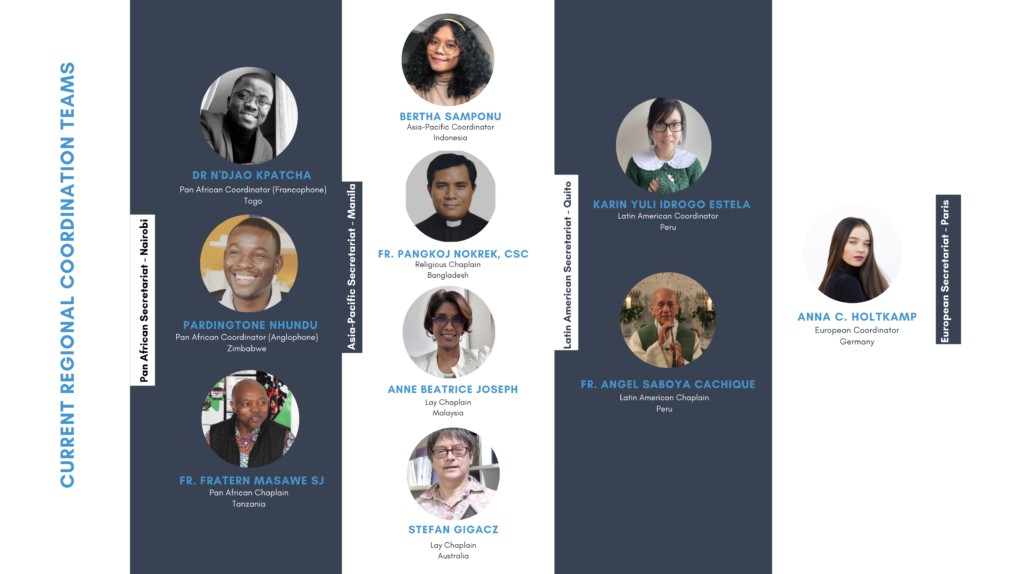
In a nutshell, the significance of the paths we thread towards addressing the needs of the coming years and our impact on the next generations guides us as a Student, Church and an Educational Movement as well as an International Organization.
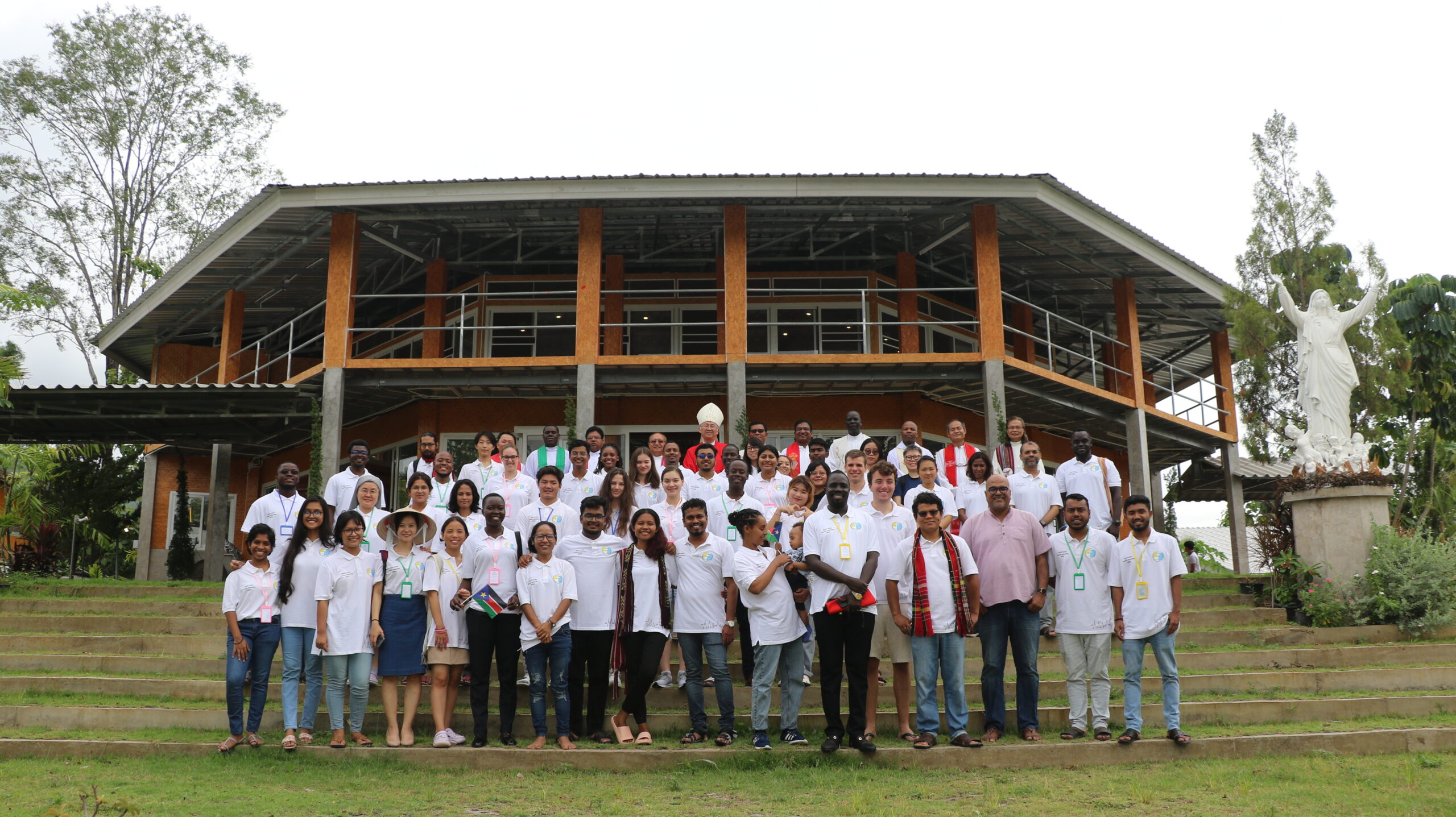
Final Declaration on “Global Climate Emergency: Capacity building of tertiary students to be advocates for environmental, social, cultural, political and economic justice”
World Assembly, July 3-9, 2023
1. Introduction:
This Climate Emergency Declaration of July 2023 by the International Movement of Catholic Students (IMCS) Pax Romana is first of all, a global pragmatic step by the Movement in support of Pope Francis’s encyclical of Laudato Si’. Secondly, it is an action response to the pronouncement made on 12 December 2020 by the United Nations Secretary-General, António Guterres asking governments to declare a climate emergency in their countries until neutrality is attained. Finally, this is a deliberately informed step taken by an international body of approximately 5 million young catholic tertiary students – opinion leaders in their countries, continents, and eventually internationally.
Pope Francis in his address to the United Nations in 2015 said that young people remind us that the earth is not a possession to be squandered, but an inheritance to be handed down. IMCS Pax Romana agrees with Pope Francis in this statement and Laudato Si’ that as young people, we are faced not with two separate crises, one environmental and the other social, but rather with one complex crisis, both social and environmental. To this effect, each and every one of us on mother earth has an obligation to make deliberate choices to care for the common home and in important cases such as this one, come together as an international body to make declarations that allow young people to target specific environmental stewardship actions.
This Declaration has been ascended to by the delegates of IMCS Pax Romana World Assembly who gathered in Chiang Mai, Thailand from 03 – 09 July 2023 on Global Climate Emergency at the newly constructed International Youth Training Centre. The World Assembly brought 103 participants (76 in-person and 27 online) from 33 different countries in Europe, Africa, Asia Pacific, Latin America and North America. Representing about 53.5% males and 46.5% females; this comprised Catholic Students Leaders, Observers, Facilitators, Interpreters as well as Chaplains & the Religious.
2. Key Issues:
The study sessions included workshops, presentations and panel discussions, during which the participants were conveyed important information regarding the Global Climate Emergency, advocacy and partnership building for climate action, and mechanisms of other organizations such as the UN.
During the study sessions by various resource persons from different backgrounds, fields, organisations and countries, many issues relevant to the climate emergency were pointed out and highlighted. Some of the issues identified are as follows:
- Rising global temperature: The Earth’s average temperature has been going up because of the release of greenhouse gases, mainly carbon dioxide, into the atmosphere. This results in different outcomes like heat waves, droughts, lost crops, drinking water shortage, increasing the risk of wildfires and the melting of ice caps.
- Extreme weather events: As the Earth’s temperatures increase, glaciers and ice sheets melt, resulting in the rise of sea levels. This poses a danger to coastal communities, low-lying islands, and ecosystems that are vulnerable. It can also lead to an increase in coastal erosion, intrusion of saltwater, and occurrences of flooding. The rising of ocean levels also causes conflicts among communities due to the problems associated with migration and land ownership.
- Loss of biodiversity: Climate change disrupts ecosystems and puts biodiversity at risk. Many species are unable to adapt to rapidly changing conditions, resulting in habitat loss, species extinction, and imbalances in ecosystems.
- Food Sovereignty: Food and water security are also affected by climate change. It impacts agricultural productivity, leading to crop failures, reduced yields, and higher food prices. Additionally, water availability is affected, with some regions experiencing droughts and others facing increased rainfall and flooding, both of which can disrupt water supplies.
- Health problems: Furthermore, climate change contributes to the spread of diseases, such as vector-borne diseases like malaria and dengue fever. Changing temperatures and rainfall patterns create more favourable conditions for disease vectors. Heatwaves and air pollution also pose risks to human health.
What one may consider as the smallest or most insignificant are the same groups of people that get the worst impact of issues relating to climate change, especially as they are the ones who interact closely with nature.
During many instances throughout the study sessions, the facilitators stressed the importance of local communities on climate change action. Through generations of close interactions with the environment, indigenous peoples safeguard an estimated 80% of the world’s remaining biodiversity. Just as the smallest of communities are the most affected by the issues that were discussed, together, the global community has an opportunity to reorient the way it interacts with nature and build resilience for all through collaborating with and learning from indigenous peoples, the stewards of nature.
1. Relocation and loss of land: Innate communities and those living in destitution frequently depend on normal assets for their jobs. Climate change has led to the loss of land and assets due to rising ocean levels, expanded flooding, and desertification, constraining these communities to migrate.
2. Food and water insecurity: Climate change disturbs rural homes and diminishes crop yields, driving to nourishment deficiencies and expanded nutrition-related healthcare costs. Indigenous communities and those underneath the poverty line are especially defenceless to these impacts, as they regularly depend on subsistence cultivating and have restricted access to alternative food sources.
3. Health dangers: Climate change increments the spread of illnesses, such as water borne illnesses and vector-borne illnesses, which can excessively influence indigenous peoples and those living in poverty. Constrained access to healthcare and insufficient framework exacerbates this issue.
4. Cultural loss: Indigenous peoples have deep connections to their ancestral land, traditional knowledge and practices, which are often threatened by climate change. Loss of land, natural resources, and traditional knowledge can lead to the erosion of cultural identity and practices.
5. Limited resources for adaptation: Indigenous peoples and those living in poverty regularly have constrained monetary assets and access to technology, making it troublesome for them to adjust to the impacts of climate change. This compounds their defencelessness to climate-related dangers and challenges.
The need for immediate action to address climate change issues and mitigate their effects is crucial, as presented by countless statistics. Even so, there are many people who still deny its effects or potential for destruction. Climate change is already causing significant damage to ecosystems, communities, and economies around the world. Without prompt action, the impacts will only worsen, leading to more severe consequences such as those mentioned above. Taking action now can help reduce greenhouse gas emissions, promote sustainable practices, and protect the planet for future generations.
3. Commitments and Actions:
In strengthening awareness and mobilising individuals and communities to take action on climate change, advocating and educating will be of major importance. Advocate is a means of promoting policies and practices to tackle climate change, whilst education focuses on providing people with knowledge and resources so that they can make informed decisions. The fundamental role in driving change and fostering a collective effort to combat climate change is played by both advocacy and education.
It is crucial that we come together with other organisations and interested parties to address this crisis in an effective way. We can create a collective impact on the ground that will result in real change and sustainable future through pooling of resources, knowledge and expertise.
As stated already, climate change disproportionately affects vulnerable communities, including those living in poverty and indigenous populations. Collaboration with these communities and relevant stakeholders is essential to ensure their voices are heard and their unique needs are addressed. By working together, organisations can develop inclusive and equitable strategies that build resilience and empower these communities to adapt to climate change. This collaboration can also help preserve indigenous traditional knowledge and practices that contribute to sustainable resource management.
The collective voice of organizations and stakeholders grows stronger and more influential when they work together. They can push for policy changes, raise public awareness, and garner public support for climate action by working together. The collaborative advocacy between IMCS Pax Romana and other stakeholders may exert pressure on policymakers and governments to prioritize mitigation of climate change and to put effective measures into action. Together, we can form a powerful movement that drives systemic change by speaking with one voice.
4. Call to Action:
The group of youth can be called to action regarding the global climate emergency by organising events or protests, creating educational campaigns, using social media to spread awareness, and collaborating with youth-led organisations and movements focused on climate activism. It is important to provide information about the urgency of the issue, the potential impacts on their future, and the power of collective action in creating change. Encouraging them to engage in sustainable practices in their daily lives and empowering them to advocate for policy changes can also be effective ways to mobilise youth.
Youth participation in climate change action is strengthened through multi-stakeholder settings. Reduction of greenhouse gases, adoption of renewable energy, providing technological and financial support to each other in implementation, scientific innovation, research and collaboration, policy advocacy and education and awareness building can be easily done when we partner with like-minded organisations and groups. This will enhance the quality of outcomes as well as have a significant impact on addressing climate change. The recognition gained by networking, partnering and combining with recognised institutes and organisations will lead to the increased visibility and positive public perception. It also increases the reach and influence that IMCS Pax Romana has, as these alliances open up pathways for new connections and audiences.
Governments play a pivotal role in deciding the progress of the Global Climate Emergency. The importance of mobilising all governmental levels in climate action has long been acknowledged. However, many nations throughout the world have failed to involve their local branches in the battle against climate change despite the fact that there are clear recommendations for creating such action, often put forward by global bodies.
Local governments are becoming more significant in global climate policy. At the local level, climate action follows established paths of sustainable development activity. There is a lot of opportunity for learning from past sustainability experiences, according to the history of climate action in cities. The reasons for responding to climate change, the many actions used, and the municipal structures and networks that represent cities in the global domains are some components of climate change governance that are crucial at the local level.
As tertiary Catholic students with a network of intellectuals and professionals in communication, it is our duty to use these resources to motivate the governing bodies in our respective countries to focus on and prioritize the Global Climate Emergency in their agendas, both nationally as well as locally. It is also important to be persistent and consistent in the efforts that we as an organization make. By actively engaging with the government and by raising awareness, we can contribute to the collective effort in addressing the global challenge.
5. Conclusion:
IMCS Pax Romana is dedicated to advancing environmental knowledge through research and development, giving its members the chance to speak up for the marginalised, promoting environmental protection, and working with other groups and stakeholders. To encourage a united effort to address climate change and advance change, advocacy and education are crucial. To meet vulnerable communities’ unique needs and conserve indigenous knowledge and practices that support sustainable resource management, collaboration with relevant stakeholders is crucial.
Young Catholic tertiary students made the IMCS Pax Romana Climate Emergency Declaration with the purpose of addressing the pressing social and environmental challenges. The proclamation highlights the responsibilities and initiatives IMCS Pax Romana will take to assist environmental activism and preservation. The call to action encourages Catholic youth organisations and communities worldwide to take action in response to the Global Climate Emergency and places an emphasis on collaboration with vulnerable communities and pertinent stakeholders.
Heartfelt thanks to the IMCS Pax Romana for their unwavering commitment to fostering dialogue and collaboration among Catholic youth. This assembly has provided a platform for us to come together, share our experiences, and discuss the pressing issues that our world faces today, in light of the Global Climate Emergency. IMCS Pax Romana has not only created a space for all of us to connect, but it has also empowered us to take action. Through various workshops, discussions, and presentations, we have gained valuable knowledge and insights into the current situation of the earth’s climate. We have learned about the devastating effects of climate change and the urgent need for collective action.
Sincere gratitude to the organisers for curating a diverse range of speakers and experts who have enlightened us with their wisdom and expertise. Their passion and dedication have inspired us to become agents of change in our communities and beyond. I would like to acknowledge the tireless efforts of the IMCS Pax Romana team in ensuring the smooth execution of this Assembly. From the planning to the seamless, every detail has been taken care of with utmost precision. Your hard work and dedication have not gone unnoticed, and we are truly grateful for your commitment to making this event a resounding success.
Lastly, gratitude to all the participants who have travelled from far and wide to be a part of this assembly. Your presence and active engagement have made this gathering truly special. Together, we have formed lifelong connections and friendships that will continue to inspire and support us in our future endeavors. As we leave this Assembly, let us carry the knowledge, inspiration, and commitment to address the global climate emergency and create a better world for future generations. May we continue working together towards a sustainable and just future.

